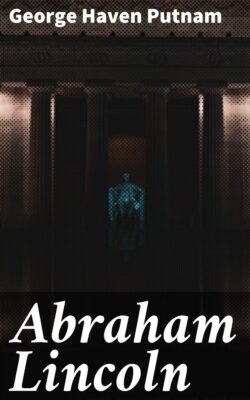Abraham Lincoln

Реклама. ООО «ЛитРес», ИНН: 7719571260.
Оглавление
George Haven Putnam. Abraham Lincoln
Abraham Lincoln
Table of Contents
II
III
IV
V
VI
VII
VIII
IX
APPENDIX
THE ADDRESS OF ABRAHAM LINCOLN
INTRODUCTORY NOTE
CORRESPONDENCE WITH LINCOLN, NOTT, AND BRAINERD
INTRODUCTION
CORRESPONDENCE WITH MR. LINCOLN
PREFACE
ADDRESS
INDEX
FOOTNOTES:
Отрывок из книги
George Haven Putnam
The People's Leader in the Struggle for National Existence
.....
The passage of the Kansas-Nebraska Act made clear to the North that the South would accept no limitations for slavery. The position of the Southern leaders, in which they had the substantial backing of their constituents, was that slaves were property and that the Constitution, having guaranteed the protection of property to all the citizens of the commonwealth, a slaveholder was deprived of his constitutional rights as a citizen if his control of this portion of his property was in any way interfered with or restricted. The argument in behalf of this extreme Southern claim had been shaped most eloquently and most forcibly by John C. Calhoun during the years between 1830 and 1850. The Calhoun opinion was represented a few years later in the Presidential candidacy of John C. Breckinridge. The contention of the more extreme of the Northern opponents of slavery voters, whose spokesmen were William Lloyd Garrison, Wendell Phillips, James G. Birney, Owen Lovejoy, and others, was that the Constitution in so far as it recognised slavery (which it did only by implication) was a compact with evil. They held that the Fathers had been led into this compact unwittingly and without full realisation of the responsibilities that they were assuming for the perpetuation of a great wrong. They refused to accept the view that later generations of American citizens were to be bound for an indefinite period by this error of judgment on the part of the Fathers. They proposed to get rid of slavery, as an institution incompatible with the principles on which the Republic was founded. They pointed out that under the Declaration of Independence all men had an equal right to "life, liberty, and the pursuit of happiness," and that there was no limitation of this claim to men of white race. If it was not going to be possible to argue slavery out of existence, these men preferred to have the Union dissolved rather than to bring upon States like Massachusetts a share of the responsibility for the wrong done to mankind and to justice under the laws of South Carolina.
The Whig party, whose great leader, Henry Clay, had closed his life in 1852, just at the time when Lincoln was becoming prominent in politics, held that all citizens were bound by the compact entered into by their ancestors, first under the Articles of Confederation of 1783, and later under the Constitution of 1789. Our ancestors had, for the purpose of bringing about the organisation of the Union, agreed to respect the institution of slavery in the States in which it existed. The Whigs of 1850, held, therefore, that in such of the Slave States as had been part of the original thirteen, slavery was an institution to be recognised and protected under the law of the land. They admitted, further, that what their grandfathers had done in 1789, had been in a measure confirmed by the action of their fathers in 1820. The Missouri Compromise of 1820, in making clear that all States thereafter organised north of the line thirty-six thirty were to be Free States, made clear also that States south of that line had the privilege of coming into the Union with the institution of slavery and that the citizens in these newer Slave States should be assured of the same recognition and rights as had been accorded to those of the original thirteen.
.....